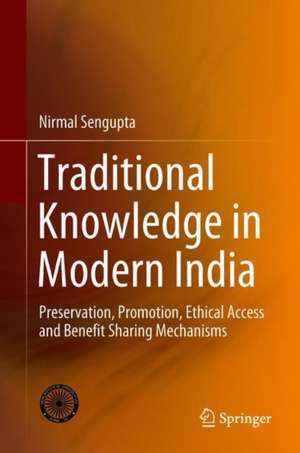Traditional Knowledge in Modern India: Preservation, Promotion, Ethical Access and Benefit Sharing Mechanisms
Autor Nirmal Senguptaen Limba Engleză Hardback – 15 oct 2018
It discusses the origin of the topic, its importance, recent developments in India and abroad, and what is being done and still needs to be done in order to preserve India’s traditional knowledge. The discussions address a broad range of fields and organizations: from Basmati rice to Ayurvedic cosmetics; from traditional irrigation and folk music to modern drug discovery and climate change adaptation; and from the Biodiversity Convention to the WHO, WTO and WIPO.
| Toate formatele și edițiile | Preț | Express |
|---|---|---|
| Paperback (1) | 635.47 lei 6-8 săpt. | |
| Springer India – 26 ian 2019 | 635.47 lei 6-8 săpt. | |
| Hardback (1) | 641.71 lei 6-8 săpt. | |
| Springer India – 15 oct 2018 | 641.71 lei 6-8 săpt. |
Preț: 641.71 lei
Preț vechi: 754.95 lei
-15% Nou
Puncte Express: 963
Preț estimativ în valută:
122.81€ • 127.24$ • 102.49£
122.81€ • 127.24$ • 102.49£
Carte tipărită la comandă
Livrare economică 21 martie-04 aprilie
Preluare comenzi: 021 569.72.76
Specificații
ISBN-13: 9788132239215
ISBN-10: 8132239210
Pagini: 205
Ilustrații: XVII, 177 p.
Dimensiuni: 155 x 235 mm
Greutate: 0.45 kg
Ediția:1st ed. 2019
Editura: Springer India
Colecția Springer
Locul publicării:New Delhi, India
ISBN-10: 8132239210
Pagini: 205
Ilustrații: XVII, 177 p.
Dimensiuni: 155 x 235 mm
Greutate: 0.45 kg
Ediția:1st ed. 2019
Editura: Springer India
Colecția Springer
Locul publicării:New Delhi, India
Cuprins
1. The Manufacture Of The ‘Traditional’.- 2. Global Mechanism of Protection and Sharing.- 3. Traditional Knowledge and Basic Needs.- 4. Biodiversity and Genetic Resources.- 5. Traditional Knowledge in Manufacture and Industries.- 6. Traditional Cultural Expressions, Expressions Of Folklore.- 7. Traditional Knowledge in Miscellaneous Other Areas.- 8. Conclusion.
Notă biografică
Nirmal Sengupta, who studied at the Indian Statistical Institute, was until recently a National Fellow at the Indian Institute of Advanced Study, Shimla. He has been a Consultant to the Ministry of Commerce and Industries; Chairperson, Working Group on Flood Management for the Twelfth Five-Year Plan; Expert, Netherlands Minister for Development Cooperation; and consultant to the UNDP, FAO etc. He has authored and edited several books, including “Managing Common Property - Irrigation in India and the Philippines” (Sage, 1991), and “The Economics of Trade Facilitation” (Oxford, 2007).
Textul de pe ultima copertă
This book demonstrates how traditional knowledge can be connected to the modern world. Human knowledge of housing, health and agriculture dates back thousands of years, with old wisdom developing and becoming modern. But in the past few decades, global communities have increasingly become aware that some of this valuable knowledge has fallen by the wayside. This has sparked systematic efforts at the local, national and global levels to connect this neglected knowledge to the modern world.
It discusses the origin of the topic, its importance, recent developments in India and abroad, and what is being done and still needs to be done in order to preserve India’s traditional knowledge. The discussions address a broad range of fields and organizations: from Basmati rice to Ayurvedic cosmetics; from traditional irrigation and folk music to modern drug discovery and climate change adaptation; and from the Biodiversity Convention to the WHO, WTO and WIPO.
Caracteristici
Illustrates how India’s traditional knowledge can by systematically preserved and employed Presents instruments for using traditional knowledge as a developmental resource Discusses traditional knowledge and expressions of folklore from an intellectual property perspective
